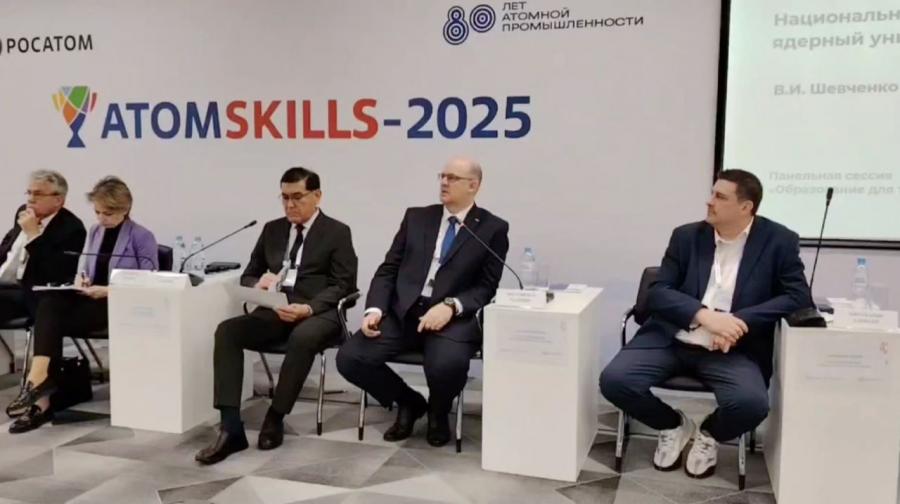As part of the business program of the AtomSkills 2025 industry championship, which is taking place this week in Yekaterinburg, a panel session "Education for Technological Breakthrough" was held. Vladimir Shevchenko, Rector of the National Research Nuclear University MEPhI, acted as one of the key speakers at the discussion. Below we present the most important theses of the rector's speech.

Vladimir Shevchenko began his speech by saying that there are three basic upper-level indicators that determine the "class" of any university. These indicators include the quality of applicants, the quality of the university's partners, and the quality of the teaching staff.
The quality of applicants can, with all reservations, be judged by the average score of the Unified State Exam, and according to this indicator, MEPHI ranks second in the country, at the budgetary places of the Moscow university, the average score is 95.7, while 38% of applicants are enrolled without entrance tests – these are the winners of various high-level Olympiads.
"These are children who are in no way inferior to their peers at MIT, Harvard, Tsinghua University, Imperial College, and the best technical universities in the world," said Vladimir Shevchenko.
But each applicant has his own training trajectory, his own subjectivity, his own idea of who they want to become and where to go. At the exit, they are met by the state, society, economy, market demands with their macro characteristics.
The Rector of MEPhI emphasized that there is a correlation between the level of education of applicants and their salary a few years after graduation: the more "high-achieving" children come to university, the higher the salary they will receive 5 years after graduation. However, the rector noted, the question is where they will receive it. Fintech workers now have a higher income level than those who are engaged in material production.
MEPhI has a key partner, the State Corporation Rosatom, where 37% of the university's graduates (including all its branches) went to work last year. However, Rosatom, the Kurchatov Institute and other reputable organizations in the field of nuclear research are not the "drivers" of wage growth – fintech, telecom, etc. organizations play this role.
"We have a conflict between what the state and our mission want from us and what the economy dictates to us." – stated Vladimir Shevchenko. In a sense, MEPhI is trying to "cheat" the economy.
Another important aspect is the issue of autonomy. There are a number of huge companies that originated in universities. "Never in my life could Google have been created in the AltaVista R&D department. Google was founded at the university in order to destroy AltaVista," emphasized Volodymyr Shevchenko.
But it is not the universities that own these companies, but the people who created them. These people worked on what they were interested in and what they considered important. At university, they received freedom that is not available in the corporate R&D sector. The thing is that a truly new thing is new because there is no order for it, and its creators risk spending their time and effort on it.
This is why the right to take risks is extremely important, which is not present in our corporate and managerial culture. "We don't have the habit of our large companies talking publicly about their failures, analyzing them. We must always go from victory to victory," said the rector.
When Elon Musk began developing the Falcon launch vehicle project, everyone mocked him, but today Falcon controls half of the global unmanned launch market. And this is a direct consequence of the fact that mistakes were made, but lessons were learned from them and further progress was made. Neither the first, nor the second, nor the fifth mistake was considered as a reason to curtail this activity.
Lasers, one of the inventors of which was Nikolai Basov, a graduate of MEPhI, arose as a practical implementation of the ideas of spontaneous emission of radiation formulated in the famous works of Einstein. But when Einstein wrote them, he did not mean that it was possible to make a device such as a laser. Lasers did not arise because the task was to make laser technology or optical discs. It was only when this technology began to develop that huge markets emerged, which began to generate orders for laser solutions.
Thus, one cannot expect an industrial partner to place an order, in response to which a conditional Einstein comes up with a new theory. It happens that way, but it also happens quite differently – when fundamental science itself is the customer of technology. For example, gravitational detectors, for which the 2015 Nobel Prize was awarded, and which were predicted by the same Einstein 100 years before, would not have been possible without the development of laser interferometric technologies.
Concluding his speech, Vladimir Shevchenko touched upon the topic of artificial intelligence, which, according to the Rector of MEPhI, has a more revolutionary impact on education than it seemed a few years ago. Generative systems based on large language models make it possible not only to find the answer to a query, but also to generate answers to queries that do not yet exist. This will eventually change the teaching methodology and give rise to new principles for conducting exams. And all the universities in the world are now actively engaged in solving one problem – how to ensure that intelligent decision support systems do not lead to an even greater degradation of the cognitive functions of children and adults – which, unfortunately, we are witnessing now.





